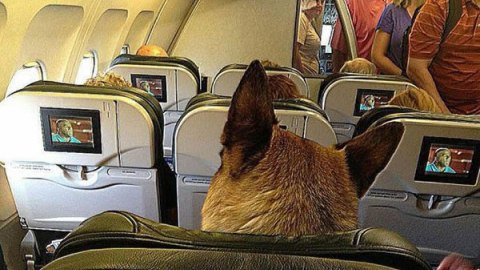Costa Rica News – You have decided to move to Costa Rica to enjoy the wildlife, the slower pace of life, and the warm, beautiful weather. However, bringing your pets with you requires a whole new set of plans. Bringing your pet to Costa Rica is an in depth process, but if you follow the rules and regulations it can be accomplished.
Horses
 There are many reputable international horse shipping companies dealing with those logistics daily, utilizing private as well as commercial airlines. Charter airlines are generally contracted on an as-needed basis and are usually specially outfitted for that specific contract. Once loaded, it’s not possible for the horses get out of the shipping boxes at all during the flight. According to one shipping agent, most flights are 6 to 10 hours, and rarely is a flight longer than 14 hours. The horses have room within the transport boxes to move a couple of steps back and forth and, as mentioned, some air boxes have adjustable panels. Most airlines do not take more than 6 containers, so 18 horses are usually the maximum head count allowed per flight. Weight as well as space is a factor in determining the cargo allowed.
There are many reputable international horse shipping companies dealing with those logistics daily, utilizing private as well as commercial airlines. Charter airlines are generally contracted on an as-needed basis and are usually specially outfitted for that specific contract. Once loaded, it’s not possible for the horses get out of the shipping boxes at all during the flight. According to one shipping agent, most flights are 6 to 10 hours, and rarely is a flight longer than 14 hours. The horses have room within the transport boxes to move a couple of steps back and forth and, as mentioned, some air boxes have adjustable panels. Most airlines do not take more than 6 containers, so 18 horses are usually the maximum head count allowed per flight. Weight as well as space is a factor in determining the cargo allowed.
How do horses generally handle the air travel? Although shipping by air can be stressful for some horses, particularly due to the noise and vibrations with certain aircraft, for the most part the flight itself is not much more stressful than it is for their human counterparts. Sedatives may be administered to problem horses, but horses are generally supplied with plenty of hay to keep them occupied. Although well-ventilated, the Air stables don’t have windows, just access doors for their human handlers to check on them. As with human passengers, the take-off and landings may be more problematic for some, but once the plane is in the air, it’s generally not as rough as an over-the-road trailer ride for the horse. Cross-oceanic flights often fly at higher altitudes than shorter domestic flights, so turbulence is not a major issue except in rare circumstances.
Quarantine
Moving horses from country to country requires, by law, a quarantine period where horses must be isolated. The United States Department of Agriculture requires that any equine being permanently exported overseas must spend a 30 day period in an approved isolation facility, which meets federal standards regarding space, sanitation and proximity to other animals. During this isolation period, precise testing and preparation of all needed paper work is done, and this is before the horse leaves the United States. When the horse reaches its destination in Costa Rica, there are another series of blood tests and getting their results takes about two weeks and then if everything tests appropriately, then the horse is released to its final home.
How much is it?
The cost is figured out by miles traveling, for example, the airplane transportation costs roughly $1150 ($1000+$150) for 1000 km (600 miles), $3150 ($3000+$150) for 5000 km (3000 miles). We calculated costs based on the airline transport costs (both the airfare and rental of a horse cargo box) plus $150 for transport to and from the airport. Note that the costs for transporting horses depend on the route and the season, so actual figures could vary substantially from the above figures. Transporting a horse by airplane is expensive due to the weight and space it occupies. However, for long trips it can be economic as there are no overnight costs, and it uses up a minimum of your time. Furthermore, it is less stress for the horse than a very long trip by road. For specific information on transporting your horse to Costa Rica, visit http://www.aphis.usda.gov/regulations/vs/iregs/animals/downloads/cs_eq_prt.pdf
Dogs
Before beginning the import procedures, make sure that your vet is approved by the Government Veterinarian  Authority in the country of origin. For example, if an animal is departing the United States, the vet will need to be USDA Accredited. Requirements in Summary1) Pet Immigration Form: Ahead of time, obtain a pet immigration form from the Ministry of Agriculture (M.A.G) in Costa Rica. The form cost 20,000 colons (roughly $40.00) and is good for a one-month period from date of issue. Have this form with you when you pass through customs at the airport in Costa Rica.2) All animals need to have Full Vaccinations:
Authority in the country of origin. For example, if an animal is departing the United States, the vet will need to be USDA Accredited. Requirements in Summary1) Pet Immigration Form: Ahead of time, obtain a pet immigration form from the Ministry of Agriculture (M.A.G) in Costa Rica. The form cost 20,000 colons (roughly $40.00) and is good for a one-month period from date of issue. Have this form with you when you pass through customs at the airport in Costa Rica.2) All animals need to have Full Vaccinations:
Requirements for a dog moving to Costa Rica are the following:
- Rabies MUST be over 30 days and less than one year. A three year rabies vaccination is NOT acceptable.
- DHLP-(Distemper/Hepatitis/Leptospirosis/Parvo-virus) MUST be less than one year.
- International health certificate, endorsed by the governing agency of your country. Health certificate must be less than 10 days old at entry.
- ALL pets arriving as manifest cargo (on their own airway bill or ticket) MUST have an IMPORT PERMIT prior to arrival.
- Pets flying to Costa Rica as excess baggage, checked in at the passenger terminal with you, do not require an import permit.
Cats
- Rabies MUST over 30 days and less than one year. A three year rabies vaccination is NOT acceptable.
- FVRCP-(Feline Viral Rhinotracheitis/Calicivirus/Paneokopenia) MUST be less than one year.
- International health certificate, endorsed by the governing agency of your country. Health certificates must be less than 10 days old at entry.
- ALL pets arriving as manifest cargo (on their own airway bill or ticket) MUST have an IMPORT PERMIT prior to arrival.
- A pet flying to Costa Rica as excess baggage, checked in at the passenger terminal with you, does not require an import permit.
You need an International Health Certificate: Your vet should have these in stock. It’s a good idea to call ahead and ask. This is an international health certificate that needs to be completed by your vet within 10 days of departure. This form needs to also state that the US is free of African Horse sickness and Rift Valley Fever and that your pet(s) have not traveled to regions affected with these diseases. Depending on the logistics of your particular pet relocation and the specific health certificate being used an additional USDA Endorsement maybe required on this health certificate.
You also need a Pet Quarantine Permit: The quarantine permit must be issued by the Ministry of Agriculture and Animal Control (“Ministerio de Agricultura y Ganaderia”). It costs $22.00 US (twenty-two U.S. dollars) per pet. You can file for this permit prior to your pet’s arrival through a Custom Agency, in person if you are already in Costa Rica, or through a third party that represents you. Also, you need a personal letter stating your pet’s market value or a document that proves it, such as an invoice. Lastly, you need a USDA Endorsement. All documents above must be sent to your local USDA for their stamp of approval. All original documentation must travel with the pets.
The good news is that there is no quarantine period for dogs or cats coming to Costa Rica, only a heck of a lot of paperwork.
If you would like to know more about shipping your vehicle or personal belongings to Costa Rica, get your FREE Shipping to Costa Rica E-Book
Click Here for Your Free Shipping Ebook.
By Stacey Dunahay


1 comment
I can’t speak on behalf of the horses but I can for the routine house pet situation. This article is filled with inaccuracies. Truth be told, most of the airlines srt their own policies and procedures while blaming Costa Rica for the rules. Delta is different than American with is different from United etc. I spent weeks researching this topic for Boomers Offshore and found out that I was getting the runaround from everybody.
While my story is NOT DEFINITIVE, it does contain more information that this article. Read on: http://www.boomersoffshore.com/Newsletters/01-Published/028/importing_pets.htm